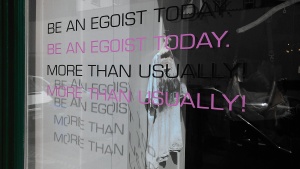In the end, we are left faced with the same problem Rousseau struggles with in Emile. The self is relational, and defined largely through the opinions of others. Because it is so relational, we continually look outside of ourselves in an effort to develop self-love. But, especially in a society characterized by greed, self-love transforms into something comparative, and a healthy self-love (“proper pride in our own achievements” (187)) becomes elusive. Rousseau tries to solve this problem through educating oneself to be freed from comparisons, but Blackburn — rightly, I think — is skeptical that this is possible and is skeptical that getting rid of comparisons altogether is a good thing, for even proper pride involves some degree of comparisons.
Read the whole review here. (NDPR, by the way, is worth subscribing to. I frequently come across reviews of books I think I should read.)
(The photo here, by the way, is of a store window in Prague that astonished me by its frankness. Peter Sloterdijk is right: we live in an age of “enlightened false consciousness”!)

